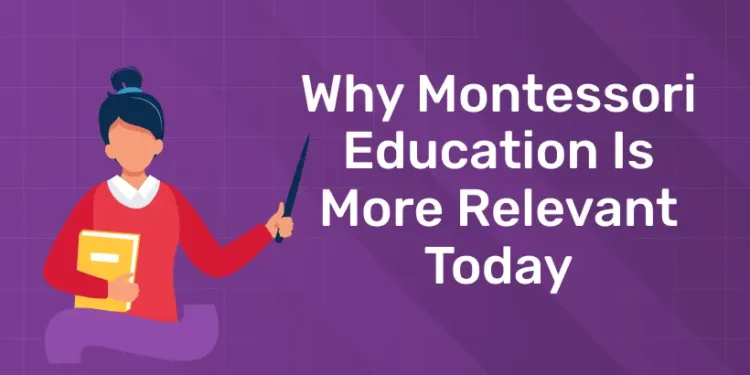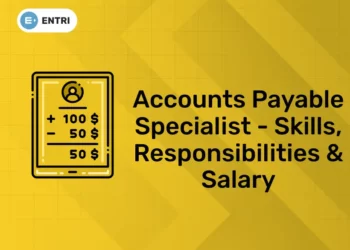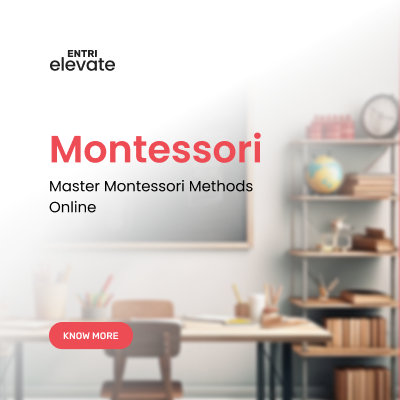Table of Contents
The fundamentals of human learning remain the same. A hundred years ago, children would not have had access to the range of experiences that today’s kids may have. But children still learn from their experiences and surroundings in the same manner that they did when Maria Montessori first began studying how people learn. She noted that youngsters are inherently intelligent and inquisitive. When Montessori allowed her “difficult to teach” kids to follow their natural curiosity, she discovered that learning became easier and more organic. This is still the case today. In this article we are discussing about why montessori education is still relevant today.
Start now to become a certified Montessori teacher! Get free Demo Here!
Reasons For Why Montesssori Education Still Relevant Today
The creation of the Montessori Philosophy followed good procedure
In addition to being a doctor and a scientist, Maria Montessori was an educator. Her background and education made her an exceptional candidate for child study in the classroom. She provided support to kids who struggled in conventional academic settings. For those kids, the conventional teaching approaches had previously been shown to be ineffectual; Montessori’s data supported this assertion. She worked with real kids who struggled in the traditional classroom to establish the Montessori philosophy of education. She used her philosophy of learning with the challenging students in the classroom and saw how they reacted to different teaching strategies. Through these efforts, she was able to refine the Montessori Method to the point that a wide range of learning styles and abilities could be successfully taught using it. The Montessori Method was developed with great care and scientific precision, which makes Maria Montessori’s lessons still applicable today.
The Montessori classroom continues to produce successful students
As long as students are doing well in Montessori classrooms, Maria Montessori’s montessori method of teaching will be relevant. Many kids who had an early Montessori education have gone on to achieve great success. Montessori educational programs are available anywhere in the globe. A tribute to the worth of Maria Montessori’s teachings is the enduring nature of these programs.
Space and Time
Montessori believed that kids should be given plenty of undisturbed time to work with the items. Today, this translates into a three-hour work cycle in Montessori schools, which gives kids adequate time to explore new content or reflect on what they’ve learned while still allowing them to flow through focused work. The guide observes the children’s work during this period and uses the information to inform lesson planning, or she instructs individual or small groups of students. In a Montessori classroom, formative evaluation takes place every day.
Creative thinking and problem-solving abilities
To aid kids in learning fundamental ideas like addition and linguistic patterns, Dr. Montessori created specific tools. Nowadays, kids use tangible investigation to self-correct as they learn abstract concepts. The Montessori curriculum fosters interconnection, charity, and interpersonal relationships. Guides carry out the curriculum, encouraging kids to experience the world and cultivate appreciation for all things created and discovered.
Achieve your dream of becoming a teacher! Join Montessori Course Now!
Promotes Self-reliance
The Montessori method of education teaches kids to think and behave independently from a young age. Adaptability and autonomous learning are essential in a world that is changing quickly.
Encouragement of Mental Health
The overall development that the Montessori approach emphasizes—balancing intellectual, physical, emotional, and social growth—supports mental health. Considering the growing emphasis on mental health in today’s society, this is especially pertinent.
Ability to Adjust to Technological Developments
Although Montessori methods have historically been low-tech, they can be successfully combined with contemporary technology to improve learning. This flexibility guarantees that, even in the digital age, a Montessori education is still relevant.
Exchange of knowledge and cooperation
As an essential part of the learning process, a Montessori classroom purposefully promotes increased collaboration and social learning. In a Montessori classroom, kids are given the flexibility to practice social skills including sharing, negotiating, compromising, and mediating. They are also taught how to control their own interactions with others. The end effect is a self-regulating classroom where children, under the direction of the Montessori guide, mostly handle arising social conflicts.
Entri’s Montessori Teacher Training Course
The Montessori Teacher Training Course from Entri will assist you in learning the more complex methods, such as role playing and curriculum-based project management. The students will receive internationally recognized certificates that will aid them in their job search.
Obtaining a postgraduate degree in Montessori education will lead to additional specializations in the field of education. The candidates will be able to pursue their studies more effectively than anywhere else in the world with the help of flexible course plans. The Postgraduate course offered by Entri offers new possibilities for the teachers in the Montessori teaching sector. At Entri, the mentors will help you understand how to properly coach the younger minds.
CONCLUSION
The long-standing tenets of Montessori education—individualized instruction, the development of critical skills, independence, social-emotional development, hands-on learning, environmental awareness, technological adaptability, lifelong learning, mental health support, and a community focus—make it exceptionally well-suited to the demands and difficulties of contemporary education and society. Its ability to adapt and think ahead is demonstrated by its continued significance today.
Frequently Asked Questions
Can Montessori education integrate with modern technology?
Yes, despite being low-tech by nature, Montessori principles can be successfully incorporated with contemporary technology to improve learning and get kids ready for a digital future.
Are Montessori schools widely available?
Worldwide, there are numerous Montessori schools to choose from, as well as tools and training to help parents apply the concepts at home.
How can parents incorporate Montessori principles at home?
Incorporating real life activities into daily routines, encouraging independence, providing hands-on learning materials, and creating a child-friendly environment are all things that parents can do. Numerous publications and internet sites provide advice on implementing Montessori at home.










